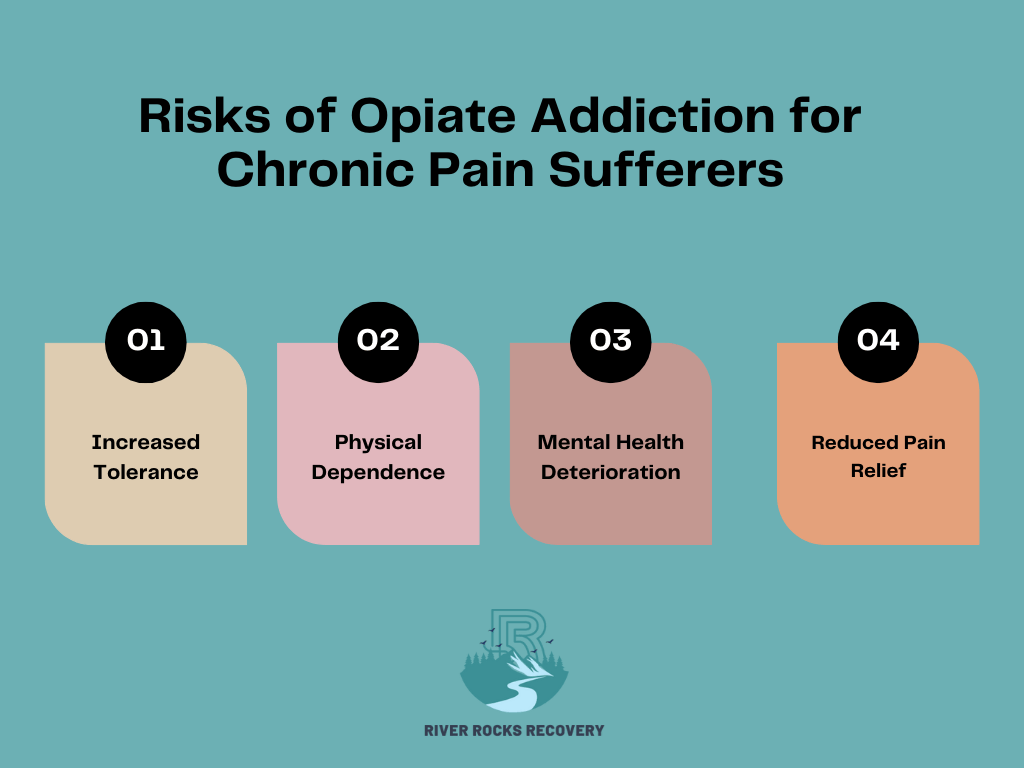Chronic pain is a common health issue and opioids are generally prescribed to avoid severe pain among patients. Over time, patients become addicted to this drug, meaning a patient requires a high dose of Opioids to get relief. This instantly leads us to physical dependence, where the body feels relief only after consuming this drug.
Well, here the psychological factor also plays a crucial role, meaning a patient feels that Opioid is the only medicine that can help them to reduce pain. This thing usually makes a patient addicted to Opioid.
In this article, we will learn the connection between chronic pain and opiates in-depth. Let’s go!
The Importance of Opiates in Pain Relief
Opiates are a type of pharmaceutical often known by the name opioids, comprising both illegal substances like heroin and prescribed medications like oxycodone, hydrocodone, and morphine. These medications reduce pain perception and provide relief by attaching to opioid receptors in the brain and spinal cord.
Opioids can be a lifesaver for a lot of people with chronic pain, enabling them to function and take part in everyday activities. However, because of the potential for addiction and reliance, their usefulness in long-term pain management is being called into question.
So, what’s the connection between both?
Prescription drugs are frequently the first step in the relationship between opiate addiction and chronic pain. Opioids may be provided to patients who are in severe pain and need respite. The body may get tolerant to certain medications over time, requiring higher dosages to produce the same degree of pain relief. Physical dependence may result from this, in which case the body develops withdrawal symptoms in the absence of the substance.
There are psychological aspects as well. Significant emotional and psychological suffering, such as anxiety, depression, and hopelessness, can be brought on by chronic pain. In addition to relieving pain, opioids can provide euphoria, which can momentarily mask these unpleasant emotions. Opioids can be especially addicting for people who are dealing with chronic pain because of this dual effect.
How Chronic Pain Leads to Opiate Addiction
1. Prolonged Use of Opioids
Opiates work by interacting with receptors in the brain to reduce the sensation of pain, offering relief to those with chronic conditions. However, prolonged use can cause the brain to become dependent on these substances to manage pain, leading to tolerance, which is when the body requires larger doses to achieve the same relief. This escalation increases the risk of addiction.
2. Psychological Impact of Chronic Pain
Living with chronic pain can take a toll on mental health, leading to conditions like depression, anxiety, and stress. Many individuals may begin to use opioids not only for pain relief but also to cope with the emotional burden of their condition. Over time, this can foster a dangerous reliance on the drug, both physically and psychologically.
3. Reward System in the Brain
Opiates trigger the release of dopamine, a neurotransmitter associated with feelings of pleasure and reward. For someone in chronic pain, the relief opioids provide can become deeply reinforcing. The brain begins to associate the drug with pleasure, leading to repeated use and, eventually, addiction.
The Risks of Opiate Addiction for Chronic Pain Sufferers
While opioids may offer temporary relief, long-term use can have serious consequences. Addiction can develop rapidly, leading to:
- Increased Tolerance: As the body adjusts to the drug, higher doses are needed, which can lead to overdose.
- Physical Dependence: Individuals may experience withdrawal symptoms if they try to reduce or stop using opiates.
- Mental Health Deterioration: Opiate addiction often exacerbates underlying mental health issues, creating a cycle of dependence.
- Reduced Pain Relief: Over time, opioids may become less effective, leading to intensified pain and increased drug use.
How to get rid of Opioid Abuse?
To get rid of Opioid abuse, we need to follow a multifaceted approach. So, here are a few ways to stop dependency on the drug.
1. Choose Alternative Pain Management
It’s hard to investigate non-opioid pain management techniques. Physical therapy, acupuncture, biofeedback, and cognitive-behavioral therapy (CBT) are a few examples of this. For some forms of chronic pain, non-opioid treatments such as antidepressants, anticonvulsants, and nonsteroidal anti-inflammatory drugs (NSAIDs) may also be helpful.
2. Educating Patients About Opiates
With face-to-face sessions, patients can get to know about the side effects of Opiates and get control of their pain treatment using alternatives or trying to consume them in lesser amounts.
3. Join Support System
To eliminate the need for drugs from your body, join support groups, family counseling, or other community resources.
4. Follow the Rules
To tackle the opioid epidemic, stricter opioid prescription rules must be implemented, as well as improved access to addiction treatment facilities.
5. Holistic Care
A comprehensive approach that treats both the physical and psychological elements of chronic pain may be effective. This includes coordinating care among pain experts, psychologists, and Addiction Treatment Programs and counselors.
Treating Opiate Addiction in Chronic Pain Sufferers
For those who have developed an opiate addiction, recovery is possible. Effective addiction therapy program often involves a combination of medical and psychological approaches:
- Medication-Assisted Treatment (MAT): Medications like methadone, buprenorphine, or naltrexone can help manage withdrawal symptoms and reduce cravings for opioids.
- Behavioral Therapy: Therapy plays a crucial role in addressing the underlying causes of addiction and teaching coping strategies for both pain and substance use.
- Support Groups: Peer support, such as groups like Narcotics Anonymous (NA), can provide a network of individuals who understand the struggles of opiate addiction and chronic pain.
Get Started With Addiction Treatment Program- River Rocks Recovery!
Ready to take one step further? Join River Rocks Recovery. We understand the difficulties and complexities of addiction, and we are dedicated to delivering thorough, compassionate care to help you reclaim your life.
Our partial hospitalization program is designed to treat the physical, emotional, and psychological elements of addiction treatment programs, ensuring that each patient receives individualized therapy based on their specific needs.
Conclusion
The relationship between chronic pain and opiate addiction is complex and challenging, but there are effective ways to manage both. For those dealing with chronic pain, it’s important to explore non-opioid treatment options to minimize the risk of addiction. If addiction has already developed, seeking comprehensive treatment that addresses both pain management and substance use is key to long-term recovery.
At River Rocks Recovery, we offer a range of addiction treatment programs designed to help individuals overcome opiate addiction while addressing chronic pain. Our services include Partial Hospitalization Programs (PHP), Intensive Outpatient Programs (IOP), and Outpatient Programs, all of which are tailored to meet the unique needs of each individual. Contact us today at (888) 905-6281 to learn how we can help you take the first step toward healing.
FAQs on Connection Between Chronic Pain and Opiate Addiction
What is chronic pain?
Chronic pain is pain that lasts for more than three months. It can be caused by a variety of factors, including injuries, illnesses, and underlying medical conditions.
What are opiates?
Opiates are a class of drugs derived from the opium poppy plant. They include prescription pain medications such as oxycodone, hydrocodone, and morphine, as well as illegal drugs like heroin.
How are chronic pain and opiate addiction related?
Individuals with chronic pain are at a higher risk of developing opiate addiction. This is because opiates are often prescribed to manage chronic pain, and repeated use can lead to dependence and addiction.
What factors contribute to the link between chronic pain and opiate addiction?
Several factors contribute to the link between chronic pain and opiate addiction, including:
- Tolerance: Over time, the body may develop tolerance to opiates, meaning that a higher dose is needed to achieve the same pain relief.
- Dependence: Repeated use of opiates can lead to dependence, which means the body becomes physically reliant on the drug.
- Addiction: Dependence can progress to addiction, characterized by compulsive drug-seeking behavior and negative consequences.
- Mental health issues: Chronic pain can often be accompanied by mental health conditions such as depression and anxiety, which can increase the risk of addiction.





























